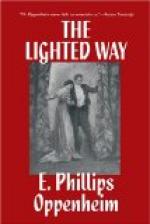“Do you know any one here?” she asked.
“No one,” he answered.
She dropped her voice almost to a whisper. Arnold bent his head and listened with a curious pleasure to her little stream of words.
“It is a strange mixture of people whom you see here,” she said, “a mixture, perhaps, of the most prosaic and the most romantic. The Count Sabatini, whom you see talking to my husband, is my brother. He is a person who lives in the flood of adventures. He has taken part in five wars, he has been tried more than once for political offenses. He has been banished from what is really our native country, Portugal, with a price set upon his head. He has an estate upon which nothing grows, and a castle with holes in the roof in which no one could dwell. Yet he lives—oh, yes, he lives!”
Arnold looked across at the man of whom she was speaking—gaunt and olive-skinned, with deep-set eyes and worn face. He had still some share of his sister’s good looks and he held himself as a man of his race should.
“I think I should like your brother,” Arnold declared. “Will he talk about his campaigns?”
“Perhaps,” she murmured, “although there is one about which you would not care to hear. He fought with the Boers, but we will not speak of that. Mr. and Mrs. Horsman there I shall say nothing about. Imagine for yourself where they belong.”
“They are your husband’s friends,” he decided, unhesitatingly.
“You are a young man of great perceptions,” she replied. “I am going to like you, I am sure. Come, there is Mr. Starling standing by the door. What do you think of him?”
Arnold glanced across the room. Mr. Starling was apparently a middle-aged man—clean-shaven, with pale cheeks and somewhat narrow eyes.
“An American, without a doubt,” Arnold remarked.
“Quite right. Now the lady in the gray satin with the wonderful coiffure—she has looked at you already more than once. Her name is Lady Blennington, and she is always trying to discover new young men.”
Arnold glanced at her deliberately and back again at his hostess.
“There is nothing for me to say about her,” he declared.
“You are wonderful,” she murmured. “That is so exactly what one feels about Lady Blennington. Then there is Lady Templeton—that fluffy little thing behind my husband. She looks rather as though she had come out of a toy shop, does she not?”
“She looks nice,” Arnold admitted. “I knew—”
She glanced up at him and waited. Arnold, however, had stopped short.
“You have not yet told me,” he said, “the name of the man who stands alone near the door—the one with the little piece of red ribbon in his coat?”
It seemed to him that, for some reason, the presence of that particular person affected her. He was a plump little man, sleek and well-dressed, with black hair, very large pearl studs, black moustache and imperial. Mrs. Weatherley stood quite still for a moment. Perhaps, he thought, she was listening to the conversation around them.




